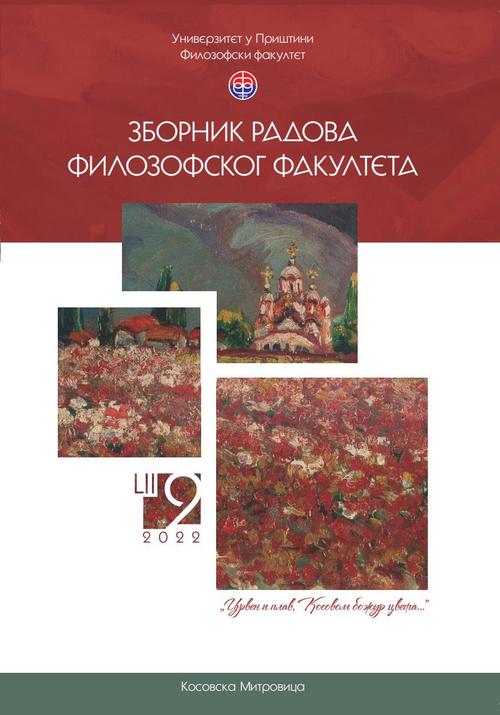Породица као контекст информалног образовања
Sažetak
Због измењених друштвених околности и све снажније улоге информалног образовања у процесу развоја личности, циљ рада је усмерен на сагледавање значаја породичног деловања, које, судећи по дужини деловања на личност, заузима најдоминантнију улогу у информалном образовању. Полазећи од чињенице да је породица први и доживотни систем за дете, само са измењеним улогама у различитим животним циклусима, учињен је покушај указивања на кључне тачке деловања на породицу, али и на дете од стране породице, у функцији, пре свега, просоцијалног развоја. Просоцијални развој се одвија моделовањем детета родитељским понашањима кроз која се изражава пожељан систем вредности. Посматрајући породицу као васпитача, али и васпитаника у информалном образовању, у раду је наглашена потреба праћења поступака који имају научно и стручно утемељење, уз опрез од „падања под утицај“ имплицитних теорија васпитања које се промовишу на друштвеним мрежама и у неким „модерним“ друштвеним групама. У том смислу, истиче се неопходност подршке породици у васпитном деловању и животно практичним активностима, које представљају једро и језгро информалног образовања у породичном контексту.
Reference
Антић, С. (2018). Информално учење тражи своје место у формалним контекстима образовања. Психолошка истраживања, 21 (1), 41–60.
Кулић, Р. (2002). Формално, неформално и информално учење и образовање. Андрагошке студије, 9 (1–2), 11–24.
Милутиновић, Ј. (2003). Информално образовање – појмовни оквир и карактеристике. Педагошка стварност, XLIX (5–6), 394–407.
Павићевић, М. и Петровић, Д. (2015). Разлике између формалног, неформалног и информалног образовања. Зборник радова Учитељског факултета, 9, 103–113.
Поповић, Д. и Зуковић, С. (2014). Партнерство породице и школе у условима транзиције. Зборник радова Филозофског факултета у Приштини, 44 (1), 219–235.
Сакач, М., Марковић, С., Марић, М. (2018). Однос традиционалне и савремене породице у контексту анализе димензија породичног живота студената у Војводини. Зборник радова Филозофског факултета у Приштини, 48 (1), 97–111.
Срна, Ј., Милојковић, М., Мићовић, Р. (1997). Породична терапија. Београд: Центар за брак и породицу.
Bretherton, I. (1990). Open Communication and Internal Working Models: Their Role in the Development of Attachment Relationship. In: R. A. Thompson (Ed.), Nebraska Symposium on Motivation: Socioemotional Development (57–113). Lincoln: University of Nebraska Press.
Bronfenbrener, J. (1997). Ekologija ljudskog razvoja. Beograd: Zavod za udžbenike i nastavna sredstva.
Chaux, E., Molano, A., Podlesky, P. (2009). Socio-Economic, Socio-Political and SocioEmotional Variables Explaining School Bullying: A Country-Wide Multilevel Analysis. Aggressive Behavior, 35 (6), 520–529.
Dalos, R. i Drejper, R. (2012). Sistemska porodična psihoterapija, teorija i praksa. Novi Sad: Psihopolis.
Denmark, F. L., Krauss, H. H., Wesner, R. W., Midlarsky, E., Gielen, U. P. (2005). Violence in Schools: Cross-National and Cross-Cultural Perspectives. New York: Springer.
Despotović, M. (2016). Obrazovanje odraslih na Zapadnom Balkanu. Beograd: Društvo za obrazovanje odraslih DVV International.
Dishion, T. J. (1990). The Family Ecology of Boy’s Peer Relations in Middle Childhood. Child Development, 61, 874–892.
Dunst, C. (2011). Informal Learning in Everyday Family Activities as Early Childhood Education. Retrieved from: http://www.puckett.org/presentations/InformalLearningMontreal2011.pdf (23. 2. 2022).
European Commission – Eurostat (2007). Adult Education Survey (2005–2007), Manual, Directorate, F: Social Statistics and Information Society, Unit F-4: Education, Science and Culture Statistics.
Gvozdenović, S. (2011). Obrazovanje i drugi srodni pojmovi. Sociološka luča, 5 (2), 82–93.
Hill, N. E. (2001). Parenting and Academic Socialization as They Relate to School Readiness: The Roles of Ethnicity and Family Income. Journal of Educational Psychology, 93, 686–697.
Kaloudi, E., Psarra, M. L., Kalemi, G., Douzenis, J., Douzenis, A. (2017). Violence in a Family Setting. Encephalos, 54 (2), 28–32.
Kant, I. (1991). Kritika čistog uma. Beograd: Beogradski izdavačko-grafički zavod.
Khoury-Kassabri, M., Benbenishty, R., Avi Astor, R., Zeira, A. (2004). The Contributions of Community, Family and School Variables to Student Victimization. Am J Community Psychol, 34 (3–4), 187–204.
Krulj, R., Kačapor, S., Kulić, R. (2003). Pedagogija. Beograd: Svet knjige.
Kulić, Р. i Despotović, M. (2004). Uvod u andragogiju. Beograd: Svet knjige.
Lazić, S. i Saveski, Z. (2012). Savetovalište za obitelj kao put do kvalitetnog roditeljstva u kontekstu informalnog i neformalnog obrazovanja. Teorijski i praktični problemi i rasprave, 61 (1), 135–142.
Polovina, N. (2011). Porodica u sistemskom okruženju. Beograd: Institut za pedagoška istraživanja.
Popović, D. (2019). Porodica i škola u prevenciji vršnjačkog nasilja. Novi Pazar: Državni univerzitet u Novom Pazaru.
Rubin, K. H., Bukowski, W., Parker, J. G. (1998). Peer Interactions, Relationships, and Groups. In: W. Damon & N. Eisenberg (Eds.), Handbook of Child Psychology, Social, Emotional, and Personality Development (619–700). New York: Wiley.
Schugurensky, D. (2000). The Forms of Informal Learning: Towards a Conceptualisation of the Field. Toronto: Centre for the Study of Education and Work – Department of Sociology and Equity Studies in Education – Ontario Institute for Studies in Education of the University of Toronto.
Spera, C. (2005). A Review of the Relationship among Parenting Practices, Parenting Styles and Adolescent School Achievement. Educational Psychology Review, 17 (2), 125–146.
UNESKO (2011). Revision of International Standard Classification of Education. Paris: ISCED.
Vranješević, J. (2012). Participacija roditelja u obrazovno-vaspitnom procesu – mogućnosti i ograničenja. Inovacije u nastavi – časopis za savremenu nastavu, 25 (3), 15–26.
Zuković, S. (2012). Porodica kao sistem – funkcionalnost i resursi osnaživanja. Novi Sad: Pedagoško društvo Vojvodine.
Detalji u vezi sa uređivačkom politikom, uključujući i autorska prava, dostupni su na sajtu SCIndeks.
http://scindeks.ceon.rs/journalDetails.aspx?issn=0354-3293

